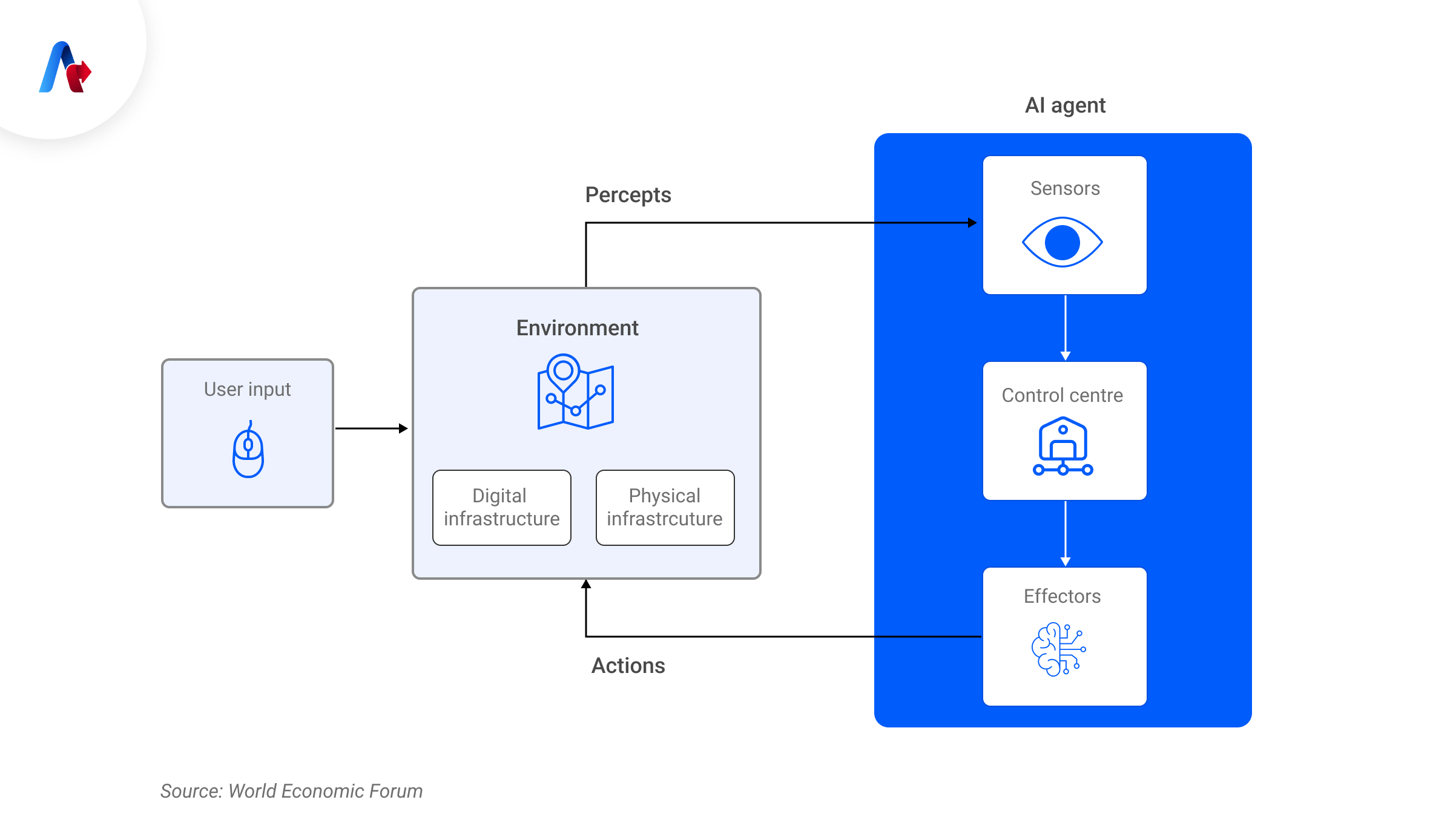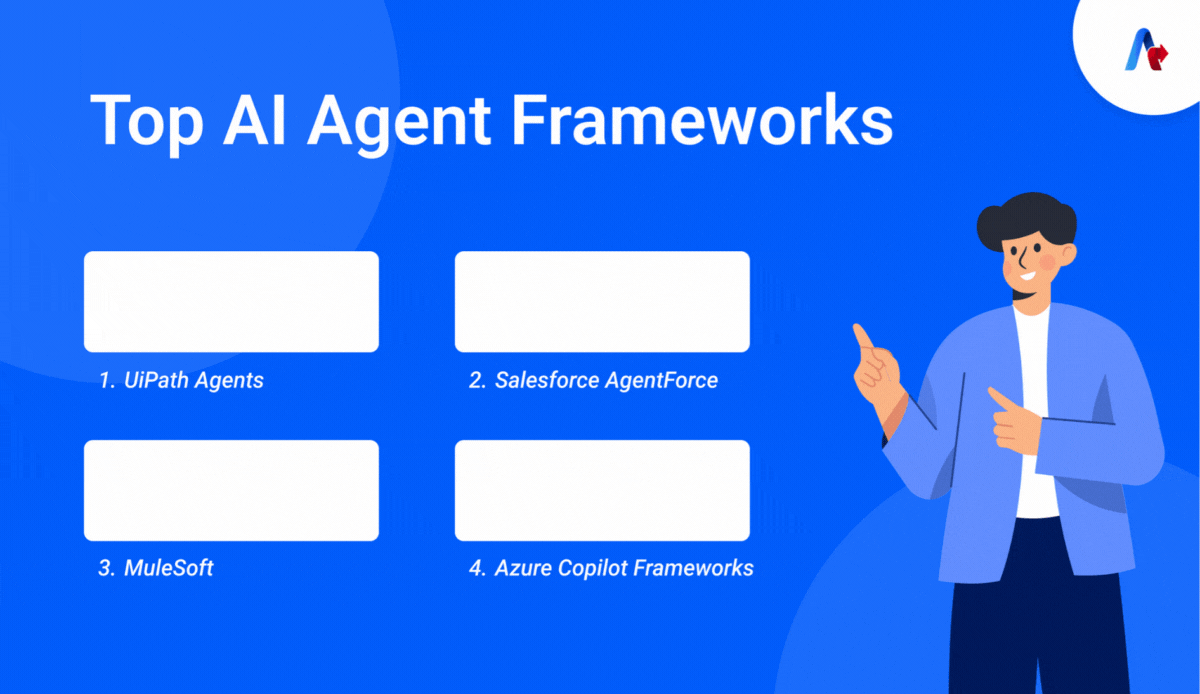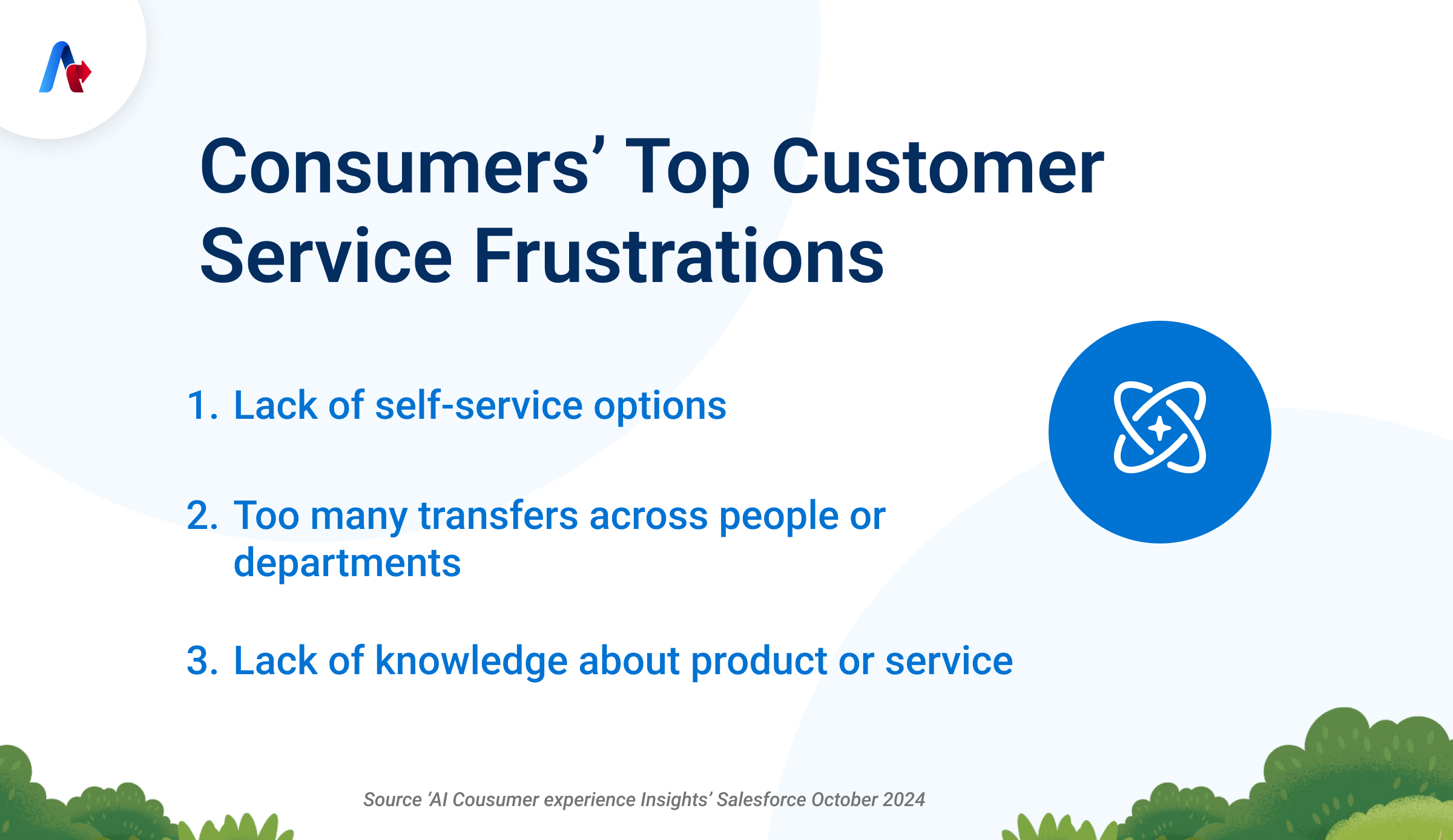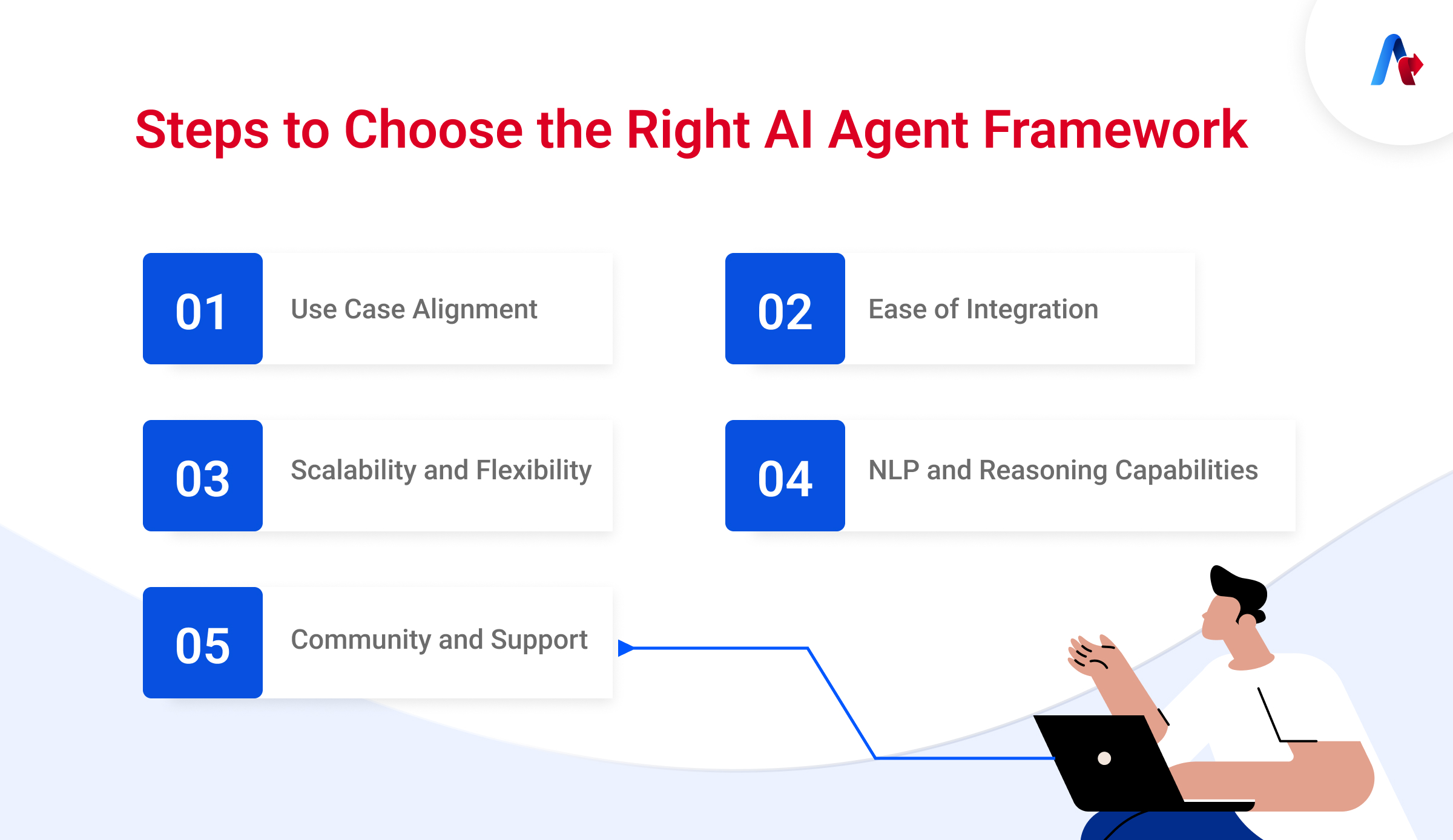AI Agent Frameworks
BLOG
13 min read
AI Agent Frameworks: A Complete Guide to Building Intelligent Agents
Artificial Intelligence is being embedded into modern businesses and consumer applications at a faster speed. With this adaption, AI agent frameworks are taking the center stage as these can perform tasks intelligently.
These digital entities, which range from self-governing research agents to virtual assistants and customer support bots, are driven by complex frameworks that dictate their reasoning, communication, and behavior.
Agentic AI solutions are designed to help businesses build, deploy, and manage intelligent agents to automate operations. Explore the top AI Agent frameworks and how these can help your company derive better results.
Before we explain to you how to choose the right framework, let us look at:
What Are AI Agent Frameworks?
AI agent frameworks are toolkits and development platforms that offer the components, structure, and resources needed to create intelligent software agents. These AI agents are self-governing programs created to carry out operations, make choices, and communicate with systems and users. GPT-4 and other large language models (LLMs) are frequently used to power AI agent systems.
In simpler terms, an AI agent framework makes it easier to create bots that can think, plan, act, and learn on their own while also cooperating with other agents.
“AI agents will become our digital assistants, helping us navigate the complexities of the modern world. They will make our lives easier and more efficient.” Jeff Bezos
Key Components of an AI Agent Framework
Building a custom AI Agent framework requires more than just plugging in a language model. It needs a robust framework that has well-defined components.
Some of the key components of an AI Agent framework include:

1. Agent Architecture and Role Definition
It defines how agents are structured and what roles they play, for example, planner, and executor. Role-based setups, like those in Microsoft AutoGen, help streamline collaboration in multi-agent environments.
2. Language Models & Learning Modules
The thinking and language abilities of the agent are powered by LLMs (such as GPT-4). Agents can get better over time when combined with RAG or adaptive learning.
3. Communication Protocols
Facilitate communication between agents and external systems, which is necessary for task distribution and multi-agent coordination.
4. Context and Perception Modules
Often driven by context managers or semantic search, these inform agents of user inputs, files, and system status.
5. Task Management and Workflow Orchestration
Agents need tools to plan, track, and adapt tasks dynamically. Some frameworks manage flows using graphs and conditional logic.
Want to build your own AI agent tailored to your business needs?
Connect with our AI Agent expertsTypes of AI Agent Frameworks and Their Use Cases
Before choosing the right type of AI Agent framework, it is important to understand its different types and their real use cases.
1. Task-Oriented Frameworks
Task-oriented frameworks concentrate on automating the process of dividing objectives into manageable steps. They mostly depend on elements like prompt engineering, tool utilization, and workflow orchestration. These tools assist users in automating repetitive tasks like writing code, creating emails, and conducting research.
Building autonomous agents that "plan and execute" across organized workflows is made easy with these frameworks.
Use Case: These frameworks are ideal for automating tasks like market research, report generation, or coding. It enables agents to plan, retrieve data, and execute actions autonomously saving time and reducing manual effort.
2. Multi-Agent Frameworks
These frameworks allow several agents, each with a unique role-based agent architecture, to collaborate. They facilitate dynamic task planning and cross-domain thinking through coordinated communication and shared memory. In this area, tools such as Microsoft AutoGen is excellent; it supports software development, data pipelines, collaborative document analysis, and other applications where agent collaboration is essential.
Use Case: Task-oriented AI agent frameworks are perfect for automating structured processes, such as multi-step reasoning tasks like creating content or planning reports, document summarization tools that extract important insights, and customer care bots that handle queries from start to finish.
3. Conversational AI Frameworks
Conversational frameworks use natural language interactions, context management, and language models to facilitate human-like communication. They are used to create voice assistants, chatbots, and help desk representatives who can comprehend and react to user inquiries instantly. Platforms like UiPath is well-liked in the healthcare, financial, and eCommerce industries because it allows for capabilities like memory, semantic search, and task processing through dialogue.

The image above shows that consumers prefer using chatbots for quick support.
Use Case: these frameworks are ideal for building virtual assistants, helpdesk chatbots, and sales reps that can autonomously plan, retrieve information and complete tasks in real time.
4. Low-Code/No-Code Agent Builders
By providing visual interfaces or minimum coding environments for the creation of AI agents, these frameworks reduce the technical barrier. Platforms with prebuilt action modules, simple integration tools, and support for external APIs enable rapid development. They are perfect for non-technical teams who require simple automation for tasks like data processing, CRM updates, or reporting, or for rapid prototyping.
Use Case: Best suited for enterprise-grade agents that need real-time data access, performance monitoring, and compliance with organizational governance.
5. Intelligent Orchestration Frameworks
Orchestration frameworks manage the integration of agents inside bigger systems and are intended for sophisticated corporate use. They oversee the monitoring of system metrics, grant access to proprietary systems, and implement organizational governance regulations. When AI agents need to communicate with databases, backend services, or event-driven architectures, are utilized to ensure dependability in mission-critical applications.
Use Case: Ideal for enterprise agents needing real-time monitoring, data access, and adherence to governance and compliance standards.
Related Read: AI Agent Orchestration: Managing Multi-Agent Systems
Ready to Integrate the AI Agent Use Cases in Your Business? Meet Our Experts for Smooth Process.
Talk to Us NowComparison of Popular AI Agent Frameworks

Choosing the right AI Agent framework can be confusing. Here is a quick comparison of best AI Agent frameworks:
| Framework | Core Features | Strengths | Best Use Case |
|---|---|---|---|
| UiPath Agents | Robotic Process Automation (RPA), AI Center, Document Understanding | Strong in automating repetitive tasks, enterprise-grade security | Back-office automation, document processing, legacy system integration |
| MuleSoft | API-led connectivity, event-driven architecture, AI integration with Anypoint AI | Seamless integration across apps, scalable for large enterprises | AI-driven data integration, process automation across systems |
| Salesforce Agentforce | Einstein GPT integration, workflow orchestration, CRM-centric automation | Native to Salesforce, real-time customer insights, personalized interactions | Sales and service automation, CRM agents, customer experience enhancement |
| Azure Copilot Frameworks | Copilot Studio, orchestration with Azure OpenAI, adaptive cards, connectors | Enterprise-ready, built-in compliance, connects with Microsoft 365 ecosystem | Productivity copilots, internal assistants, knowledge management in enterprises |
The Role of AI Agent Frameworks in Scaling Businesses
Choosing the right AI Agent framework can be confusing. Here is a quick comparison of popular AI Agent frameworks: AI Agents frameworks have become an essential tool for companies that aim at scaling efficiently and intelligently. By integrating Agentic automation, data processing, and real-time responsiveness, AI Agent frameworks help enterprises handle growing demands.
Some of the best ways these frameworks contribute to business scalability include:
1. Automates Complex Business Tasks
AI agent frameworks are excellent for automating multi-step, repetitive, and time-consuming operations that normally call for human interaction. These agents follow predetermined logic and learn from encounters to execute jobs accurately and quickly, whether they are addressing customer inquiries, processing transactions, managing processes, or scheduling tasks.
A report by IBM states that prebuilt agents boost time-to-value by 70%. Businesses can save operating costs, minimize errors, and free up human teams to work on more strategic, value-driven tasks by delegating such tasks to AI.
2. Enables Smarter Decision-Making
AI bots can instantly analyse vast volumes of data to identify patterns, identify anomalies, and generate insightful information. It enables businesses to make data-driven, more assured decisions more rapidly.
AI agents serve as intelligent assistants that enhance daily operations and long-term strategy by forecasting demand, recommending the best course of action in sales, and allocating resources optimally.
3. Improves Customer Support
AI agents significantly improve customer support since they are always available, offer consistent service, and react quickly. They can manage large numbers of questions at once without losing quality or speed, which reduces on wait times and enhances consumer satisfaction.

At least 2 out of 3 customers (67%) get frustrated when their issue is not resolved instantly. These agents provide more human-like interactions that foster loyalty and trust thanks to capabilities like sentiment analysis and natural language understanding.
4. Boosts Operational Efficiency
AI agents simplify internal operations and allow human teams to engage on more important projects by automating repetitive chores like data entry, scheduling, and task coordination. Better resource allocation across departments, shorter turnaround times, and fewer manual errors result from this.
A more flexible and effective company that can react swiftly to shifting business requirements is the result.
5. Supports Business Growth
Organizations can manage more clients, transactions, or jobs without a linear increase in staff thanks to AI agent frameworks that scale well with business demands. AI agents can be swiftly taught or set up to support new procedures or services as firms expand.
This adaptability guarantees cost-effective scalability without sacrificing operational control or service quality.
How to Choose the Right AI Agent Framework?

The requirements, technical environment, and long-term objectives of your project will all influence the AI agent architecture you choose. The following important factors will help you make your choice:
1. Use Case Alignment
Begin with outlining exactly what you want the AI agents to do for your business, like data analysis, task automation, and customer assistance. So, pick a framework that is specifically designed for your use case or that can be readily modified to meet your needs.
2. Ease of Integration
The framework should interact seamlessly with the databases, CRMs, APIs, and communication tools that are already part of your software stack. A good fit guarantees that the agent functions as a component of a coherent system and cuts down on implementation time.
3. Scalability and Flexibility
Find a framework that can accommodate your expanding requirements and manage heavier loads without compromising functionality. The ability to add new features and modify workflows is a huge plus.
4. NLP and Reasoning Capabilities
Delivering human-like interactions requires sophisticated memory management, decision-making logic, and natural language processing (NLP). Analyze how well the framework handles complex queries and comprehends context.
5. Community and Support
Choose frameworks with robust documentation, active help channels, and a strong community. These resources are very helpful for expanding your solution or debugging problems.
Related Read: Check our blog How to Select the Ideal AI Agent Solution for Your Business Needs to understand in-depth about choosing the right AI Agent.
Best Practices for Building Scalable AI Agents Frameworks
It's critical to stick to strategic development and deployment practices to guarantee that your AI agents can scale efficiently as your company expands. Here are a few tried-and-true best practices:
- Start with a Clear Objective
Prior to development, specify the main responsibilities, role, and scope of the agent. A clear goal guarantees that the AI is motivated by a purpose, which lowers superfluous complexity and boosts efficiency.
- Create a Modular Design
Utilize modular elements such as memory, task handlers, intent recognition, and integrations to construct an AI agent. This facilitates the autonomous scaling, maintenance, and updating of particular system components.
- Use Domain-Specific, High-Quality Data
Better accuracy and more dependable results are guaranteed when the agent is trained on pertinent, clean, and well-structured data. Maintain the model up to date by continuously improving the dataset in response to user interactions.
- Implement Scalable Infrastructure
Use cloud platforms or architectures that support fault tolerance, load balancing, and horizontal scaling to host your AI agents. As user demand rises, this guarantees steady performance.
- Monitor, Test, and Optimize Continuously
Monitor important metrics such as response accuracy, latency, and user satisfaction after implementation. Frequent iteration and testing keep the agent in line with changing business requirements while also increasing its efficiency.
Challenges in Implementing AI Agent Frameworks
Implementing AI Agent frameworks in a business comes with several challenges. Some of the major challenges include:
1. System Integration
It's frequently necessary to integrate Agentic AI seamlessly with legacy databases, CRMs, ERPs, and APIs. These systems might not be built for AI engagement, which makes it difficult to handle data flow, build unique interfaces, and make sure that components communicate with one another. The agent's capabilities remain restricted and unconnected to actual workflows in the absence of appropriate integration.
2. Data Quality and Availability
For AI agents to function well, they require high-quality, structured, and domain-specific data. However, it can be challenging to train models or produce insightful results when data is unstructured, siloed, obsolete, or inadequate. Preprocessing, continuous data upkeep, and dependable data pipelines are crucial but resource intensive.
3. Context Awareness
To be genuinely helpful, AI agents must be able to remember and comprehend context, particularly in complex jobs or multi-turn conversations. The inability of many existing frameworks to remember previous interactions or adjust in response to user history results in fragmented or repeating responses. Both design and computing become more sophisticated when permanent memory and contextual awareness are used.
4. Scalability
Scalability becomes an issue as the number of jobs or the number of people interacting with AI agents rises. Artificial intelligence agents must continue to operate without lag, crashes, or deterioration in response quality. A strong backend infrastructure, optimized models, and frequently real-time processing power that can effectively manage peak loads are necessary to do this.
5. User Trust and Transparency
To completely rely on AI agents, users must first comprehend and have faith in them. Users could be reluctant to employ the agent for important tasks if its choices appear capricious or ambiguous. Building user confidence and promoting adoption requires transparency through predictable behavior and explainable outputs.
Discover the Right AI Agent Solution for Your Business
Get Started TodayYour Next Step with AI Agent Frameworks
AI agent frameworks are quickly changing how companies create intelligent, self-governing systems that can manage anything from sophisticated decision-making to customer service. Choosing the best framework for your needs will rely on your technological capabilities, scalability objectives, and business requirements.
Accelirate offers comprehensive Agentic AI Services, helping businesses implement and optimize AI agent frameworks tailored to their specific needs.
There are several frameworks available, each suited for distinct use cases, such as task automation, multi-agent collaboration, or conversational AI. AI agent frameworks provide the resources to create more intelligent, responsive digital solutions, whether you're a startup exploring automation or an enterprise looking to boost efficiency.
When selecting your AI agent framework, prioritize solutions that align with your long-term goals and offer the adaptability to evolve with your business needs. Accelirate’s Agentic AI experts can guide you through this process, ensuring seamless integration and maximum impact.


